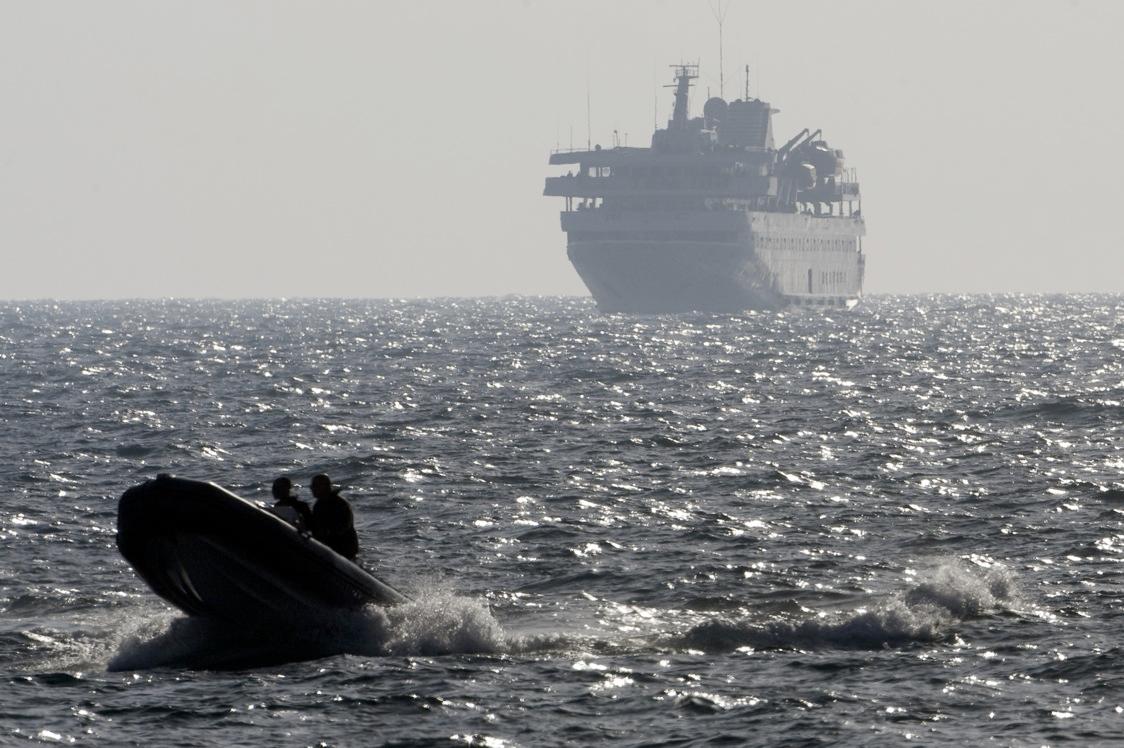Israel apologizes to Turkey over Gaza flotilla deaths
A speed boat escorts Turkish ship Mavi Marmara with Israeli troops on board near the southern port of Ashdod on May 31, 2010, after the Israeli navy raided a flotilla of aid ships bound for Gaza, killing several passengers and sparking international outrage. Almost three years later, Israeli Prime Minister Benjamin Netanyahu has apologized to Turkey for the deaths.
JERUSALEM — Israel has apologized to Turkey for the deaths of Turkish activists onboard the Gaza aid flotilla in May 2010.
Diplomatic ties between the longtime allies were essentially ruptured after the Gaza Freedom Flotilla raid, in which eight Turks participating in a waterborne protest against Israel's blockade of Gaza were killed during an Israeli navy operation to halt the ship.
In their first phone call since the incident, Israeli Prime Minister Benjamin Netanyahu told his Turkish counterpart Recep Tayyip Erdogan that "the tragic results regarding the Mavi Marmara [aid ship] were unintentional" and that Israel was sorry for "any errors that could have led to loss of life," according to a statement from Netanyahu's office.
Israel has agreed to pay compensation to the families of those killed, the statement said.
Meanwhile both countries agreed to "restore normalization between Israel and Turkey, including the dispatch of ambassadors and the cancellation of legal steps against IDF soldiers."
The apology has long been a Turkish demand. Erdogan, the leader of an Islamic party, who faces elections in the coming months, has faced a quandary between placating the United States and Europe by repairing the deteriorated ties with Israel, or emphasizing the rupture for a populist lift at the polls.
The conversation is understood to have been brokered by US President Barack Obama, at the close of his visit to Israel and the West Bank.
For the United States, the rift between two local military powerhouses it relies on for regional stability has represented a three-year long thorn in the side of progress.
Chemi Shalev, a columnist for Ha'aretz, tweeted that the Netanyahu-Erdogan conversation lasted 30 minutes, took place in a trailer at Ben Gurion Airport, and that President Obama also joined in at one point.
Obama said he welcomed the call. "The United States deeply values our close partnerships with both Turkey and Israel, and we attach great importance to the restoration of positive relations between them in order to advance regional peace and security," a White House statement read.
"I am hopeful that today's exchange between the two leaders will enable them to engage in deeper cooperation on this and a range of other challenges and opportunities."
For Obama, the final flourish may signal a turn to a new, muscular involvement in world diplomacy.
In the weeks leading up to his Mideast voyage the three substantive issues expected to be on the table in discussions were Iran's nuclear program, the civil war in Syria and the Israeli-Palestinian peace process. Instead, without saying a word, the president leaves the region having resolved a significant stumbling block no one considered worth his time.
Noga Tarnopolsky reported from Jerusalem.
Every day, reporters and producers at The World are hard at work bringing you human-centered news from across the globe. But we can’t do it without you. We need your support to ensure we can continue this work for another year.
Make a gift today, and you’ll help us unlock a matching gift of $67,000!
